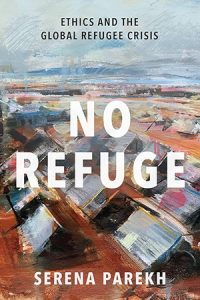No Refuge: Ethics and the Global Refugee Crisis

Author: Serena Parekh
Publisher: Oxford University Press
Year of Publication: 2020
Print Length: 280 pages
Genre: Non-Fiction / Philosophy
Topic: Ethics & Morality, Asylum, Asylum & Refugee System, Internally Displaced Person (IDP), Internationalism, Refugees & Forced Migration, Transit, Limbo, Receiving Country, Camps, Refugee Urban Settlement, Structural Injustice, Politics & Power, Equality & Inequality
Syrians crossing the Mediterranean in ramshackle boats bound for Europe; Sudanese refugees, their belongings on their backs, fleeing overland into neighboring countries; children separated from their parents at the US/Mexico border—these are the images that the Global Refugee Crisis conjures to many. In the news we often see photos of people in transit, suffering untold deprivations in desperate bids to escape their countries and find safety. But behind these images, there is a second crisis—a crisis of arrival. Refugees in the 21st century have only three real options—urban slums, squalid refugee camps, or dangerous journeys to seek asylum—and none provide genuine refuge.
In No Refuge, political philosopher Serena Parekh calls this the second refugee crisis: the crisis of the millions of people who, having fled their homes, are stuck for decades in the dehumanizing and hopeless limbo of refugees camps and informal urban spaces, most of which are in the Global South. Ninety-nine percent of these refugees are never resettled in other countries. Their suffering only begins when they leave their war-torn homes. As Parekh urgently argues by drawing from numerous first-person accounts, conditions in many refugee camps and urban slums are so bleak that to make people live in them for prolonged periods of time is to deny them human dignity. It’s no wonder that refugees increasingly risk their lives to seek asylum directly in the West.
Drawing from extensive first-hand accounts of life as a refugee with nowhere to go, Parekh argues that we need a moral response to these crises—one that assumes the humanity of refugees in addition to the challenges that states have when they accept refugees. Only once we grasp that the global refugee crisis has these two dimensions—the asylum crisis for Western states and the crisis for refugees who cannot find refuge—can we reckon with a response proportionate to the complexities we face. Countries and citizens have a moral obligation to address the structures that unjustly prevent refugees from accessing the minimum conditions of human dignity. As Parekh shows, there are ways we as citizens can respond to the global refugee crisis, and indeed we are morally obligated to do so.
Table of Contents
Preface: Turbulence
Introduction: A Tale of Two Refugee Crises
Part I: The First Crisis – The Crisis for Western Countries
1. Who Is a Refugee?
2. Moral Obligations, or Why We Should Help People Even If We Don’t Like Them
3. Reasons For and against Accepting Refugees: A Philosophical Overview
Part II: The Second Crisis – The Crisis for Refugees
4. Refugee Camps and Urban Settlements: The Problem We Have Created
5. The Price We Demand for Asylum
6. Structural Injustice
Conclusion: What Should We Do? What Should I Do?
Acknowledgments
Notes
Bibliography
Index

Serena Parekh is Professor of Philosophy and Chair of the Department of Philosophy and Religion, Northeastern University. She co-edits the journal, Feminist Philosophy Quarterly. She is the author of three books, including her most recent book, No Refuge: Ethics and the Global Refugee Crisis (Oxford 2020), which won the North American Society for Social Philosophy Book Award, the Choice Outstanding Academic Title Award, and was a finalist for the PROSE award for Philosophy from the Association of American Publishers. Her primary philosophical interests are in social and political philosophy, feminist theory, and global justice. Parekh has been interviewed as an expert on refugees in a wide variety of media including the New York Times, BBC World Service, The Atlantic, Foreign Policy, Al Jazeera, Newsweek, ABC News, Bloomberg, Slate, and CTV News in Canada, among others.
Source: https://cssh.northeastern.edu/faculty/serena-parekh/
More from Serena Parekh in this library, click here.
